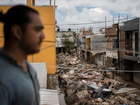Thick smog blanketed India's capital Tuesday, a day after millions celebrated the Hindu festival of Diwali with fireworks that sent air pollution levels soaring to hazardous levels.
 Full Story
Full Story
The stench of decay spread for several miles around Poza Rica on Wednesday, one of the areas hardest hit by last week's torrential rains that flooded central and eastern Mexico.
In the center of this oil-producing city near the Gulf of Mexico, a lingering cloud of dust hovered over the main avenue where soldiers worked nonstop. Farther east, near the Cazones River — which overflowed on Friday — several streets still lay under 3 feet (1 meter) of water and mud, topped by another 6 feet (2 meters) of piled-up trash, furniture, and debris.
 Full Story
Full Story
The world is on track to add nearly two months of dangerous superhot days each year by the end of the century, with poorer small nations hit far more often than the biggest carbon-polluting countries, a study released Thursday found.
But efforts to curb emissions of heat-trapping gases that started 10 years ago with the Paris climate agreement have had a significant effect. Without them Earth would be heading to an additional 114 days a year of those deadly extra hot days, the same study found.
 Full Story
Full Story
Leaf-peeping season has arrived in the Northeast and beyond, but weeks of drought have muted this year's autumn colors, and sent leaves fluttering to the ground earlier than usual.
Soaking in the fall foliage is an annual tradition in the New England states as well as areas such as the Rocky Mountains of Colorado, Great Smoky Mountains of Tennessee and North Carolina and Upper Peninsula of Michigan. As the days shorten and temperatures drop, chlorophyll in leaves breaks down, and they turn to the autumn tones of yellow, orange and red.
 Full Story
Full Story
The world's largest maritime nations gathered in London on Tuesday to consider adopting regulations that would move the shipping industry away from fossil fuels to slash emissions.
 Full Story
Full Story
Fifteen minutes before water from a flooded stream swept into her home, Lilia Ramírez took off running with what little she could carry. When she returned she found not only damage from the water that had flooded her first floor to the ceiling, but the oil it had carried now streaking her walls.
 Full Story
Full Story
A rare October storm arrived in California on Tuesday and threatened to pummel wildfire-scarred Los Angeles neighborhoods with heavy rain, high winds and possible mudslides. Some homes were ordered to evacuate.
 Full Story
Full Story
The death toll from Mexico's torrential rains rose to 47 on Sunday as the fallout mounted from flooding and landslides in different states around the country, as the authorities were rushing to help affected residents, look for missing people and try to clean several areas.
Days after heavy rains drenched several parts of Mexico, the country saw over the weekend the extension of devastation in some states, where the flooding swept away vehicles and destroyed houses and roads.
 Full Story
Full Story
Spain's weather agency on Thursday issued its highest alert for heavy rains in Alicante in the eastern region of Valencia, where deadly floods struck last year, warning of "extraordinary danger".
AEMET said the red alert would be in effect from 10:00 am (0800 GMT) on Friday in Mediterranean coastal regions of the province of Alicante, as well as in the neighboring region of Murcia.
 Full Story
Full Story
The world just had its third-hottest September on record, the Copernicus Climate Change Service said on Thursday, as global average temperatures remained stuck near historic highs for yet another month.
"The global temperature in September 2025 was the third warmest on record, nearly as high as in September 2024, less than a tenth of a degree cooler," said Samantha Burgess, strategic lead for climate at Copernicus.
 Full Story
Full Story



